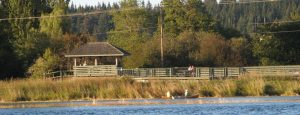
Comox Valley Dyke Road Park Coastal Resiliency Project
BRITISH COLUMBIA – Several BC projects will be recognized at the Federation of Canadian Municipalities (FCM) 2024 Sustainable Communities Awards which will be held in Fredericton, New Bruncswick on February 11th.
These awards celebrate the most innovative sustainable initiatives across Canada. From flood mitigation strategies and waste reduction efforts to the integration of clean energy in affordable housing, nine remarkable projects in communities of all sizes were awarded for their commitment to improving the lives of Canadians and setting new standards for sustainability.
The Sustainable Communities Awards honour projects that achieve environmental responsibility and excellence while yielding social and economic benefits for their communities. This year, awards were presented in eight categories: community energy, waste, climate change mitigation, natural assets, sustainable buildings, transportation, climate adaptation, and Reconciliation and anti-racism, equity and inclusion (AREI).
2024 British Columbia winners are:
The District of Saanich won in the Transportation catagory with their Community e-bike incentive pilot program. To help lower transportation emissions and reach the city’s climate goals, this income-based incentive pilot program supports residents in purchasing electric bikes. Over 380 incentives have been distributed, and the program has since been a model for similar initiatives in B.C. and North America. Research indicates both a major reduction in GHG emissions and the long-lasting satisfaction of participants.
Comox Valley Regional District won in the Climate Adaptation category for the Dyke Road Park Green Shores demonstration site. The award represents a nature-based solution to protect the coastline from erosion and flood risk, and includes the establishment of a new tidal channel and viewing boardwalk, improvements to park amenities, removal of invasive species, and the protection of archaeologically sensitive areas.
The City of Surrey won in the Natural Assets category with their Pilot testing living dykes in Mud Bay. In collaboration with Semiahmoo First Nation and the City of Delta, this project explores the use of different nature-based assets throughout 27 test areas to protect one kilometer of coastal infrastructure from flooding and erosion, all while supporting the habitat of existing local species and restoring a carbon sequestering salt marsh.
Metro Vancouver was the recipient of the Community Energy award with their Energy recovery policy and district energy projects. This first-of-its-kind policy and implementation guide is leading the way to the creation of district energy facilities that convert waste heat into usable energy, reducing reliance on fossil fuels and displacing natural gas use. Six sewer and effluent heat recovery projects are already in the works across Greater Vancouver, such as the the Sen̓ áḵw district energy project, a partly First Nations-led initiative that will provide low carbon sustainable energy for over 6,000 rental units in the City of Vancouver.
FCM”s Green Municipal Fund provides funding and education to municipalities to help them both reach net-zero and build resilient communities, while also delivering economic and social benefits such as jobs, housing and infrastructure.
Business Examiner Staff

